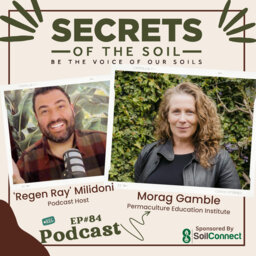Join us for an inspiring conversation with ‘Regen Ray’ Milidoni and guest Alex Wood as we delve into the critical role of soil health in our agriculture and overall well-being. This episode unfolds the transformative power of regenerative practices and the profound connection between soil and human vitality.
💡 Key Takeaways:
-Innovation in Farming: Discover the paradigm shift in agricultural research, where intuitive, grassroots experimentation is valued over traditional methodologies. Learn about the proposed “mad scientist fund” to fuel creative and unconventional farming solutions.
– Community and Education: Explore how integrating soil and nature into schools can foster empathy, mental health, and a deeper connection with our environment. Kinder gardens, community farms, and permaculture practices are essential for nurturing future generations.
– Financial and Social Support: Understand the importance of community-supported agriculture. By pre-paying for produce, consumers can help farmers achieve financial stability, allowing them to focus on sustainable practices rather than short-term yields.
Dive into this episode to learn more about how we can regenerate not just our soils but also our communities and ourselves. Together, let’s bring the human connection back into farming and protect our precious soil for future generations.
Who is Alex Wood?
Alex Wood started Future Growers with the goal of creating a resilient food supply system by promoting local food production, using regenerative agriculture, and improving the farming sector. He is currently studying agricultural science at the University of Melbourne and aims to provide affordable and nutritionally dense food to as many people as possible while also improving the profit margins of farmers and inspiring a younger generation to enter the field.
Future Growers is my attempt at the beginning this journey, transforming parcels of land across Melbourne and its surroundings into productive, vibrant, self-sustaining, and welcoming areas that promote the idea of “Symbiosis”, and produce high-quality food, fuel, and fibre. This goal is driven by the framework of permaculture, regenerative agriculture, soil biology, and plant nutrition.

In episode 54 of the “Secrets of the Soil” podcast, host ‘Regen Ray’ Milidoni sits down with Alex Wood for an in-depth discussion on the need for holistic and regenerative approaches in agriculture and education. Touching on topics ranging from grassroots farming methodologies to intuitive connections with nature, the conversation explores how we can collectively transform our society for a healthier, more sustainable future.
The Creative Farmer: Embracing Right-Brain Thinking
Ray emphasizes the necessity of allowing farmers the mental space to engage their creative, intuitive right-brain thinking. Moving away from rigid, left-brain logic can spark innovation and lead to breakthroughs akin to those seen in the field of physics. Ray proposes the “mad scientist fund” as a means of financially supporting unconventional experimentation and grassroots innovation in farming. Both Ray and Alex agree that our current agricultural research methods, bogged down with excessive bureaucracy and detached from real-world conditions, need a paradigm shift to accommodate and nurture such creativity.
Bringing Human Connection Back to Farming
One of the standout points in the conversation is Ray’s insistence on redeveloping a human connection with farming. With the decline in social interactions and growing reliance on technology, it’s crucial to revisit practices that foster community engagement. Ray suggests that visiting farmers’ markets, participating in farm tours, and getting involved in community-supported agriculture (CSA) can help bridge the gap. Furthermore, nurturing relationships with farmers allows consumers to better understand where their food comes from, making our food systems more transparent and trustworthy.
Shifting the Focus of Education Systems
A considerable portion of the discussion is dedicated to the deficiencies in our current education system, particularly its failure to foster teamwork, leadership, and a connection with nature. Ray advocates for integrating soil and nature into school curricula, emphasizing the benefits of community gardens and farming projects as educational tools. He underscores the connection between soil biome, gut biome, and mental health, asserting that getting kids accustomed to working with soil can promote empathy and care for the environment. Alex echoes these sentiments, stressing the importance of preparing individuals for real-world challenges through a more holistic, hands-on approach to education.
Youth Engagement in Regenerative Agriculture
Technological advancements in agriculture are attracting younger generations to farming, but Ray and Alex believe there’s more to their involvement than just new tech. There’s a significant interest in co-owning farmland through collaborative projects like MetaFarms and Farmlet. Young people are also keen on utilizing data and automation—connecting their farms to the Internet of Things for smarter, more efficient farming practices. This enthusiasm for regenerative agriculture stems from a collective desire to combat climate change, restore soil health, and revitalize ecosystems.
The Role of Observation in Regenerative Practices
Ray puts significant emphasis on the principle of observation, integral to permaculture and regenerative farming. Observing and journaling data from farm activities enable better decision-making and deeper understanding of the natural landscape. The concept of “living labs” and crowd-sourced research data, as demonstrated by Matt Powers’ regenerative database, showcases the potential for innovative, decentralized research in agriculture. This shift from conventional research methodologies to those that value grassroots, real-world observations could revolutionize the field of agronomy.
Supporting Farmers Through Financial and Community Means
Transitioning to regenerative practices presents financial challenges for many farmers, often pressured to prioritize quick yields to meet bank payments. Ray and Alex discuss alternative funding methods, such as community-supported agriculture, which can provide farmers with the financial stability needed to experiment and innovate. Ray suggests involving banks in projects related to carbon credits but leans towards community crowdfunding to empower farmers more effectively.
Episode 54 of “Secrets of the Soil” with ‘Regen Ray’ Milidoni and Alex Wood calls for a holistic reevaluation of our approach to agriculture and education. Emphasizing creativity, human connection, youth engagement, and observational research, the episode suggests practical steps to promote regenerative practices across all levels of society. By encouraging community support and financial assistance for farmers, integrating nature-focused education, and nurturing intuition and creativity, we can work towards a future where both our soils and ourselves are healthier and more resilient. As Ray aptly notes, it’s about changing the narrative and moving education and awareness of soil forward for the benefit of everyone.






